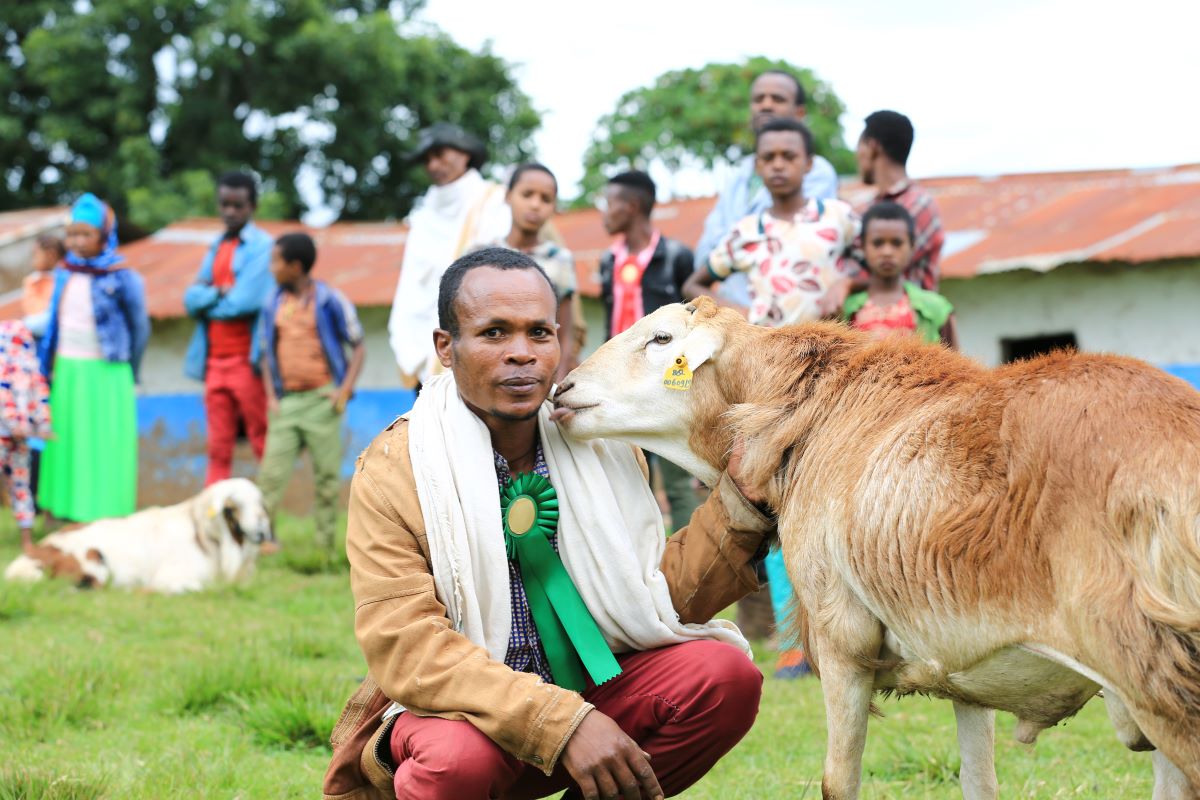New ACIAR-funded research will unlock economic opportunities for goat and sheep farmers in Ethiopia and Pakistan. The A$2.4 million project will work with rural communities to strengthen trade networks and establish production and marketing strategies to boost smallholder farming livelihoods.
Led by the International Center for Agricultural Research in the Dry Areas (ICARDA), the 4-year project builds on a decade of ACIAR-funded small ruminant research in Asia and the Pacific, and aims to bring in expertise in smallholder sheep and goat production from Ethiopia into Pakistan. Using the Community Based Breeding Platform (CBBP) developed and tested by ICARDA in Africa, the project will ensure improved genetics as part of an intervention package to improve efficiencies across the goat and sheep value chains.
Goats and sheep are cornerstones of smallholder farming systems, particularly for women and landless people, and significantly contribute to the economic and nutritional wellbeing of rural communities in Ethiopia and Pakistan. However, previous ACIAR-funded research in Pakistan found high mortality rates in kids and lambs, unregulated breeding, a weak disease surveillance system, and fragmented market linkages. Additionally, smallholder farmers face challenges due to the absence of robust extension services, gender-equitable frameworks and limited access to feed both in quantity and quality.
'Small ruminants are a vital asset for smallholder farmers, particularly women and landless communities, yet systemic challenges continue to limit their potential,' said Dr Munawar Raza Kazmi, Country Manager for ACIAR in Pakistan. 'By addressing key constraints such as high mortality rates, unregulated breeding, and weak market structures, this project offers a pathway to more resilient and profitable goat and sheep farming systems.'
Building on previous ruminant research
ACIAR Research Program Manager for Livestock Systems, Dr Anna Okello, said the new project will build on long-running ACIAR baseline investments in small ruminant systems in Pakistan, Laos, Vietnam, Fiji and Samoa and draw lessons from CGIAR innovations and approaches.
'Investing in ICARDA's proven experience and expertise in community-based breeding approaches, particularly in Ethiopia which has a strong international export industry, aims to unlock the untapped potential of small ruminant farming. The project will synergise insights and innovations to develop scalable business cases and inclusive commercialisation pathways. This aligns with the Livestock program's strategic objectives to enhance productivity, support sustainable livelihoods, build resilience in agricultural systems, and foster inclusive economic growth from livestock in our partner countries.'
Community-based breeding programs
One key approach of this new work is to incorporate proven community-based breeding programs (CBBPs) as alternatives to centralised, government-controlled breeding schemes. Pegged on previous outcomes, CBBPs are an attractive option for improving the genetics of small ruminants, as they consider farmers' needs, views, decisions, and active participation throughout a project's inception and implementation phases.

The estimated 200 CBBPs in Ethiopia open a path for genetic improvement, household income, and gender equality. Properly delivered healthcare services will enhance flock health. In addition, low-cost feeding options will be developed using local resources to address national feed shortages. Finally, the expert team will promote market efficiency by utilising digital marketing, collective action, and harmonising breeding objectives with the consumers' choices.
In this way, the initiative strongly emphasises capacity building at various levels, from farmers to extension workers and researchers. Training in animal husbandry, healthcare, efficient feeding, and promoting literacy-appropriate resources will bridge knowledge gaps, ensure wide-scale adoption of best practices, and unlock unrealised potential.
Targeting transformative impacts
These interventions target the project's transformative impacts, including establishing four CBBPs in Pakistan that manage 4,000 goats, benefit 400 households, and raise farm income by 20%.
The team will also develop three business models promoting efficient production and market performance, establish market linkage for breeding sires and festive-ready goats, and include gender-transformative approaches to ensure equal participation and benefits for women.
'The project's theory of change is anchored on developing sustainable, profitable goat and sheep value chains linking rural farmers to essential inputs, services and markets,' said Dr Aynalem Haile, the project leader and a Senior Scientist at ICARDA. 'Based on lessons from previous interventions, we expect lower transaction costs, increased income and supply of the small ruminants, improved food and nutrition security for rural communities, and stronger institutional frameworks for sustaining breeding programs.'
This notwithstanding, the project recognises challenges including inefficiencies and uptake at the grassroots level, market shocks, inflationary pressures and resistance to change in gender norms. Continuous government support, adaptive strategies, and high community trust will likely buffer these risks.
Dr G M Ali, Chairman of the PARC, expressed his appreciation during the project's inception workshop to ACIAR for its commitment to Pakistan's agriculture and its timely collaboration with ICARDA and PARC to address the technical and socio-economic realities farmers face.
'We deeply appreciate the Australian government's commitment to Pakistan's agriculture and look forward to the transformative impact this project will bring to our livestock farmers,' he said. 'With strong government backing, adaptive strategies, and community engagement, we can create an enabling environment where innovations take root and deliver lasting benefits for rural livestock farmers in Pakistan.'
'This project will redefine the value chains for goats and sheep, as most bottlenecks cut across many countries. It is a timely intervention that sets the pace for sustainable and inclusive goat-rearing development in Ethiopia and Pakistan,' said Dr Leah Ndungu, Regional Manager for ACIAR in Eastern and Southern Africa.
Learn more via the ACIAR website.






